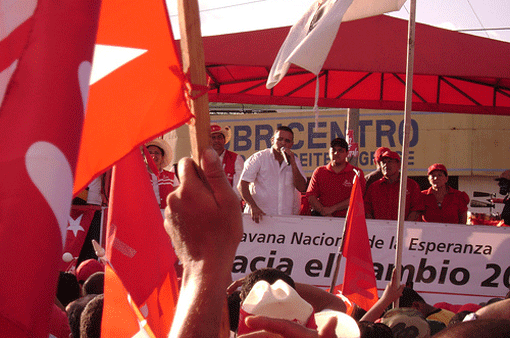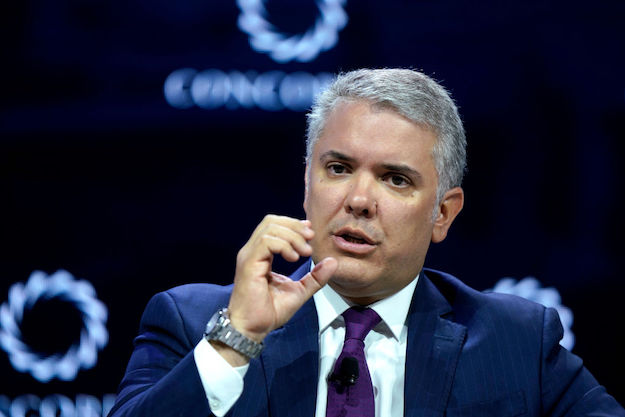The March 2009 election of Mauricio Funes and the broad coalition of social and political forces that supported his candidacy inspired the Salvadoran people and heralded a new era in the history of the smallest country in
Despite
Today, his country and party are changing, but President Funes continues to face challenges from the Left as well as the extreme Right. Business and conservative sectors do not trust him. In attempting to win their confidence, President Funes has reached out to conservative party leaders and business representatives. He appointed an economic cabinet with representatives from the financial sector to prove and honor his campaign promise to respect the free market. Like a good pupil, he is following and implementing the policy recommendations of the World Bank, the International Monetary Fund and the Inter-American Development Bank. On the other hand, President Funes faces criticism from the Left for supporting the Centro Democrático Unido (CDU) party and the emerging political movement Amigos de Mauricio that is based on the coalition of independent parties that backed him in last year’s election. The Left sees reaching out to moderate parties as a threat to the FMLN’s social base in the 2012 parliamentary and municipal elections. More sophisticated, less polarized analysts believe that President Funes is strengthening a centrist movement to protect himself from both the Right and the Left.
As part of this effort to build out the center, President Funes has shown remarkable political deftness in dealing with the other branches of government. Most agree that his management of the selection of Supreme Court justices and the appointment of the attorney general demonstrated a savvy skill for dealmaking. The president also scored a master move in the Salvadoran political chess game by altering the balance of the National Assembly. Faced with a right-wing bloc in the National Assembly that threatened to prevent initiatives he supported from passing, President Funes anticipated the inevitable split within ARENA. The president backed the 12 members of parliament who split from ARENA to join his own parliamentary group while also protecting the interests of the Partido de Conciliación Nacional (PCN), an ARENA ally. In doing it, the Funes administration guaranteed the 56 votes needed to approve international loans, and the national budget was approved despite strong ARENA opposition. Bills that were introduced years ago but were thwarted by the former majority right-wing blocs, including proposals on credit card regulation, medicine control, territory planning and fiscal policy, are now likely to become law.
The price of this success, however, could be the perception that the executive branch has intervened in the legislature, jeopardizing the independence of the different government branches and undermining the basic rule of law. President Funes must overtly respect the legislative process, limiting his role to problem solver of last resort. Otherwise,
Opposition to President Funes doesn’t come exclusively from the parties on the Right and Left of his government. He has also been challenged by officials within the FMLN, leaving some with the impression that the president lacks the support of his party and that the victorious party is not influential enough in the current government.
A bitter battle—sometimes internal, sometimes publicly aired by the media—took place within the Funes transition team before he even took office. The struggle was visible in President Funes’ government nominations—the FMLN representation is much smaller than expected even though this is the party that won the presidential election. More cabinet officials come from Amigos de Mauricio (the small CDU party) and various other political affiliations than from the president’s own party. President Funes has blamed the conservative-leaning Salvadoran media for magnifying the division between his government and the FMLN. Though President Funes and other FMLN leaders have different approaches to some issues, fundamentally both are pursuing the same goals, in the president’s view.
One such area has been the country’s proximity to
President Funes’ own political ideology is best judged by the company he keeps internationally. His administration sees
The Funes government does not fit the right-wing policy of Latin American governments that have historically begged
Having made a campaign promise not to align with ALBA countries, President Funes will not look for such partnerships now.
For all the ideological currents swirling around him, what will probably most determine the policy direction of this government will be President Funes’ strong personality. He’ll most likely make decisions on domestic and foreign policy based on his own criteria and refuse to be provoked by media sensationalism to antagonize his own party, the FMLN. What he’ll do is use inflammatory speeches, strong opinions and statements to affirm his independence as head of state, if necessary. As the president often says, he is not the president of just one political party but an entire nation. In a September 2009 speech at the UN, he asserted that he is leading a government of national unity. That same month he was named the most popular president in Latin America by the polling firm Consulta Mitofsky of
All that said, Funes does have populist tendencies. He has been known to announce projects only because they are broadly supported, rather than conducting feasibility studies. In fact, it’s not uncommon that popular, democratically elected leaders, who consider themselves beyond conflicts and partisan interests, accumulate power—a modern-day, centrist Bonapartism—believing that they transcend the give and take of politics.
We can only hope that this won’t happen with President Funes. Over the long term, such tendencies tend to further inflame divisions. In the meantime, look for






